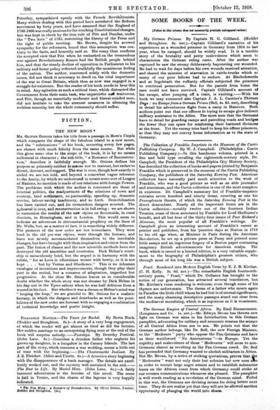FICTION.
THE NEW MOON.*
MR. OLIVER ONIONS takes his title from a passage in More's Utopia which compares the shape of the fabulous island to a new moon, and the " rubrications " of his book, occurring every few pages, are chosen with much felicity from the same source. But while this gives some clue to the scope of the book, it is by no means millennial in character ; the sub-title, "a Romance of Reconstruc- tion," describes it faithfully enough. Mr. Onions defines his purpose as primarily neither to amuse nor to instruct, but rather to divert, distract, and suggest. The war is over, though how exactly it ended we are not told, and beyond a somewhat vague reference to the Amity, by which we understand is meant some sort of League of Nations, no mention is made of our relations with foreign Powers. The problems with which the author is concerned are those of internal politics, the readjustment of the relations of town and country, land settlement, co-partnership, speeding up, domestic service, labour-saving machinery, and so forth. Demobilization has been carried out, and its tremendous dangers averted. The upheaval is over, and reconstruction is in full awing: we are shown in succession the results of the new regime on Severnside, in rural districts, in Birmingham, and in London. This would seem to indicate an adventure in circumstantial prophecy on the lines of Mr. Wells, but, as a matter of fact, it is something widely different. The pioneers of the new order are not iconoclasts. They were bred in the old pre-war regime, went through the furnace, and have not merely accommodated themselves to the inevitable changes, but have brought with them inspiration and vision from the past. The fusion of classes and the now scientific methods have not destroyed the old amenities and courtesies. Dick Helrne's court- ship is miraculously brief, but the sequel is in harmony with the rubric, for as Love is oftentimes wonne with bewty, so it is not kept . . . but by Vertue and Obedience." This is no inhuman catalogue of inventions and improvements, though they play their part in the recital, but a romance of adaptation, imperfect but progressive. At the close Mr. Onions leaves us in considerable doubt whether the whole story was not dreamt by Dick Hanle in his day-out in the Ypres salient when he was half delirious from a wound in his foot. But whether it was a dream or Helme's mind was "looping the loop," we are grateful to Mr. Onions for a realistic fantasy, in which the dangers and drawbacks as well 118 the possi- bilities of the new order are forecast with so engaging a combination of technical knowledge and poetic insight.


































 Previous page
Previous page